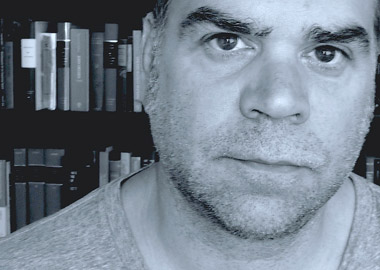One Art
BY PROF. VAROL AKMAN
Peter Gizzi (b. 1959)
For me if a poem is a closed, contained vessel, it's dead on arrival; instead, I want to leave some part of the poem open so that I or another reader can enter it again and again.
Peter Gizzi was born on August 7, 1959, in Pittsfield, Massachusetts. The last child in his family, he grew up in small towns. His parents were, like him, the youngest in their families, with much older siblings born in Italy. Coming from an immigrant culture, they worked hard to digest the aura of fifties America. Gizzi's long poem "The Outernationale" may be considered as a retort to the socialist anthem "L'Internationale." It is, in a way, evocative of his disadvantaged parents' experience of being not international but outernational.
Gizzi graduated from New York University in 1986. He then received his MFA and PhD degrees from Brown University (1991) and the State University of New York at Buffalo (1997), respectively. In 2001 he joined the English department at the University of Massachusetts, Amherst, where he is a professor in the MFA Program for Writers and Poets. He previously taught at Brown University and the University of California, Santa Cruz.
One of the most noteworthy lyric poets of his generation, Gizzi is the author of "Threshold Songs" (2011), "The Outernationale" (2007), "Some Values of Landscape and Weather" (2003), "Artificial Heart" (1998) and "Periplum" (1992). With Connell McGrath he founded o blék (pronounced "oblique"), a journal that ran from 1987 to 1993 and published verse by authors recognized for their formal brilliance, including Lyn Hejinian, Fanny Howe and Bernadette Mayer.
Gizzi's poems have been widely anthologized. His work has been translated into Bengali, Dutch, Flemish, French, Swedish and Serbo-Croatian. His honors include the prestigious Lavan Younger Poet Award (1994) from the Academy of American Poets and fellowships in poetry from the Howard Foundation, the Foundation for Contemporary Arts and the John Simon Guggenheim Memorial Foundation (2005). Gizzi was poetry editor for The Nation from 2007 to 2011.
"It Was Raining In Delft" is for me a piece that reaches for, in Rae Armantrout's words, "the ghost of the beauty of the world." While it is a poem about loyalty, it is also a poem about confusion. Although it recreates, in a cinematic tour de force, an image of this serene Dutch town in words, it also seems to bear traces of interpersonal drama and derangement. Finally, a bit of trivia: although there are more than 37 million instances of "it was raining" in Google, Gizzi's poem turns up as the first hit!
> When I was a teenager I used to visit my brother in Providence, and he'd show me stuff and I'd see books on his shelves that he was reading. I'd say, Wow, what's that? and I'd check it out. As a boy I remember we used to listen to Dylan Thomas records, and Auden records, and Orson Welles reading "The Raven" -- that kind of stuff.
> I suffered some losses at an early age, and I remember when I was thirteen when I read Shakespeare's tragedies for the first time I imagined in them the voices of people I had lost. In fact, I still think the dead do speak through literature. What I was looking for in literature back then, what I was imagining. . . I don't know. All I know is I got hip to Ezra Pound and the Beats and John Ashbery when I was seventeen or eighteen, and I really went to school in that tradition.
> I went to NYU in my twenties to study film but quickly changed my major to literature and then ancient literature. Maybe now looking back I can see that the connection to ancient language and film has to do with origins of expression. Film is a relatively new language technology of our recent human history (i.e., we are in its early phases), and if silent film is like cuneiform or hieroglyphics, we might say classic film language of the thirties and forties is like Greek and Latin.
NOTES
All the quotes are from a 2007 interview conducted by Robert N. Casper for Jubilat, a print zine. This week's poem appears in "Some Values of Landscape and Weather," a collection eulogized by Robert Creeley as "a breakthrough book in every way: for reader, for writer, and for the art." I am thankful to Professor Gizzi and Wesleyan University Press for permission to reprint. Please visit this link to hear a rendition by the poet himself: http://www.poets.org/viewmedia.php/prmMID/19020
It Was Raining In Delft
A cornerstone. Marble pilings. Curbstones and brick.
I saw rooftops. The sun after a rain shower.
Liz, there are children in clumsy jackets. Cobblestones
and the sun now in a curbside pool.
I will call in an hour where you are sleeping. I've been walking
for 7 hrs on yr name day.
Dead, I am calling you now.
There are colonnades. Yellow wrappers in the square.
Just what you'd suspect: a market with flowers and matrons,
handbags.
Beauty walks this world. It ages everything.
I am far and I am an animal and I am just another I-am poem,
a we-see poem, a they-love poem.
The green. All the different windows.
There is so much stone here. And grass. So beautiful each
translucent electric blade.
And the noise. Cheers folding into traffic. These things.
Things that have been already said many times:
leaf, zipper, sparrow, lintel, scarf, window shade.